|
|
|
Sort Order |
|
|
|
Items / Page
|
|
|
|
|
|
|
| Srl | Item |
| 1 |
ID:
130239
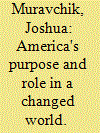

|
|
|
|
|
| Publication |
2014.
|
| Summary/Abstract |
Almost every war that America has fought since the beginning of the twentieth century was a war America had determined to avoid. We were neutral in World War I?.?.?.?until unlimited submarine warfare against our trans-Atlantic shipping became intolerable. We resisted entering World War II until Pearl Harbor. We defined the Korean peninsula as lying outside our "defense perimeter," as our secretary of state declared in 1950, a few months before North Korea attacked South Korea and we leapt into the fray. A few years later, we rebuffed French appeals for support in Vietnam in order to avoid involving ourselves in that distant country which was soon to become the venue of our longest war and greatest defeat. In 1990, our ambassador to Iraq explained to Saddam Hussein that Washington had "no opinion on?.?.?.?your border disagreement with Kuwait," which he took as encouragement to swallow his small neighbor, forcing a half million Americans to travel around the world to force him to disgorge it. A year after that, our secretary of state quipped about the violent disintegration of Yugoslavia that "we have no dog in that fight," a sentiment echoed by his successor, of the opposite party, who, demonstrating his virtuosity at geography, observed that that country was "a long way from home" in a place where we lacked "vital interests"-all this not long before we sent our air force to bomb Serbia into ceasing its attacks on Bosnia and then bombed it again a few years later until it coughed up Kosovo.
|
|
|
|
|
|
|
|
|
|
|
|
|
|
|
|
| 2 |
ID:
130242
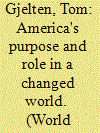

|
|
|
|
|
| Publication |
2014.
|
| Summary/Abstract |
The presidencies of George W. Bush and Barack Obama suggest what doesn't work in efforts to promote US influence in the world. By ordering an ill-conceived invasion of Iraq, Bush alienated US allies. His policies of secretly imprisoning Islamist militants and then subjecting them to "enhanced" interrogation and indefinite detention at Guantánamo struck Muslims everywhere as evidence of a war on Islam. Barack Obama, elected as the most explicitly anti-war president since Woodrow Wilson, came into office determined to undo the international damage done by his predecessor. "The walls between old allies on either side of the Atlantic cannot stand," Obama said in Berlin in 2008, and a year later, speaking in Cairo, he promised "a new beginning" with the Muslim world, with relations "based upon mutual interest and mutual respect." As promised, he withdrew US combat troops from Iraq. By 2013, however, Obama had fared little better than Bush in his global outreach. According to the Pew Research Center, support for the United States in Egypt, Jordan, Lebanon, and Pakistan was actually lower than it had been in the last year of the Bush administration. In Europe, the US favorability rating was higher than it was under Bush, but it had fallen steadily in the years since Obama took office, and it remained far below where it stood in 2000. One possible lesson from these years is that presidential personalities, speeches on foreign stages, and the changing international opinions of US policies matter less than we might think. Perhaps the most reliable measure of America's standing in the world is how appealing the country is to all those who are considering migration. Since 2007, Gallup surveys in more than one hundred and fifty countries have shown that the United States is far and away the number one favored destination. The most recent survey projected that one hundred and thirty-eight million people worldwide would like to move permanently to the United States, more than three times the number who would choose the United Kingdom, the second most favored destination. Those numbers show the United States still represents opportunity and promise to people around the world, and it is clearly in the US global interest to maintain that reputation.
|
|
|
|
|
|
|
|
|
|
|
|
|
|
|
|
| 3 |
ID:
128602


|
|
|
|
|
| Publication |
2013.
|
| Summary/Abstract |
I'm currently reading a wonderful book about the Battle of Trafalgar. Alright call me anchor faced if you will but don's forget that, as I look out my office window at an expanse of scrubby desert, I need something, a part from the tub of Atlantic sea salt on my desk, to reminder me that I am a seaman and not a Bedouin academic.
|
|
|
|
|
|
|
|
|
|
|
|
|
|
|
|
| 4 |
ID:
128665
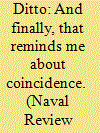

|
|
|
|
|
| Publication |
2013.
|
| Summary/Abstract |
There have been many figures, real and literary, who have maintained that there is no such thing as a coincidence. When, therefore, the last edition of NR did not arrive and the same was true for my work colleague, it seemed likely that there was a common explanation.
|
|
|
|
|
|
|
|
|
|
|
|
|
|
|
|
| 5 |
ID:
106805
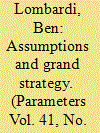

|
|
|
| 6 |
ID:
125960
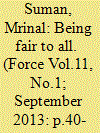

|
|
|
|
|
| Publication |
2013.
|
| Summary/Abstract |
Goldwater-Nichols Department of Defence Reorganisation Act of 1986 (GNA) is generally considered to be the first step in the currently ongoing Revolution in Military Affairs (RMA).
Major blame for the US failure in the Vietnam War was apportioned to segregated planning and operations, resulting in inhibiting the development of a unified war strategy. The catastrophic failure of the Iranian hostage rescue mission in 1980, the infirmities noticed in the invasion of Grenada in 1983 and inability to respond appropriately when 241 US marines were killed in a terrorist attack in Lebanon convinced all that emergent reforms were needed in the US defence organisation
|
|
|
|
|
|
|
|
|
|
|
|
|
|
|
|
| 7 |
ID:
130594
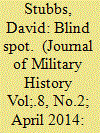

|
|
|
|
|
| Publication |
2014.
|
| Summary/Abstract |
This paper examines why the RAF maintained its view that it would be neither appropriate nor prudent to protect its bombers with long-range fighter escort until the time, late in the day, when the U.S. Army Air Forces' trials to increase the Spitfire fighter's range proved otherwise. The paper argues that some senior RAF officers, who believed that long-range fighters were unnecessary, lacked the conceptual dexterity needed after the RAF's bombers' vulnerability to single-engined fighters became apparent, and that these failings were hidden by a culture of obedience to perceived wisdom that existed within the RAF.
|
|
|
|
|
|
|
|
|
|
|
|
|
|
|
|
| 8 |
ID:
130590
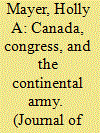

|
|
|
|
|
| Publication |
2014.
|
| Summary/Abstract |
Between 1774 and 1776 American rebels feared the British government would use French Catholic Canadians to contain their insurrection. As the empire advanced incorporation of its new subjects through the Quebec Act, the Continental Congress invited them to join its fellowship and invaded Canada to secure its cause. The invitations required that the rebels broaden definitions of civil, specifically religious, liberties, whereas enlistment of some Canadians challenged the Continental Army to practice what Congress proclaimed. Recruiting Catholic Francophone "others" by Protestant Anglophones as a strategy of war and nation building tested ideologies within the military sphere; the results reveal a precarious fit between developing public policy, military exigencies, and older biases
|
|
|
|
|
|
|
|
|
|
|
|
|
|
|
|
| 9 |
ID:
090396
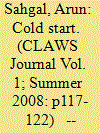

|
|
|
|
|
| Publication |
2008.
|
| Summary/Abstract |
Notwithstanding the above concerns, there can be no doubt that the cold start doctrine is a viable response to Pakistan's proxy war strategy of bleeding India. It represents a significant advance in India's conventional capabilities. Analyses of the recent exercises indicate that the requisite organisational and conceptual changes are being effected to make the doctrine a viable response option.
|
|
|
|
|
|
|
|
|
|
|
|
|
|
|
|
| 10 |
ID:
128130
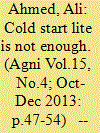

|
|
|
|
|
| Publication |
2013.
|
| Summary/Abstract |
In the wake of the Kargil War, India developed a limited war doctrine. The key elements of this doctrine are that is a proactive and offensive. It is proactive in the sense that while being strategically reactive, for instance to terror provocation emanating from Pakistan, it is proactive at the operational level in choosing the time and place of conventional response and shaping of the battle. It is offensive in terms of its intent of taking the battle to the enemy, fighting on and making gains on enemy territory and its aim plus of punishing the Pakistan military.
|
|
|
|
|
|
|
|
|
|
|
|
|
|
|
|
| 11 |
ID:
130699
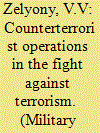

|
|
|
|
|
| Publication |
2014.
|
| Summary/Abstract |
With reference to special measures taken by the Israeli authorities, the author examines the nature and specific aspects of counterterrorist operations, suggest his own definition and develops a classification of the fight against terrorism.
|
|
|
|
|
|
|
|
|
|
|
|
|
|
|
|
| 12 |
ID:
125193
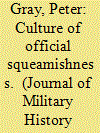

|
|
|
|
|
| Publication |
2013.
|
| Summary/Abstract |
Although it waged the largest and most costly of Britain's Second World War campaigns, RAF Bomber Command was not mentioned in Prime Minister Churchill's 1945 Victory Speech and its Commander-in-Chief, Air Chief Marshal Sir Arthur Harris, was left off the Victory Honours List. The crowning insult to Bomber Command veterans was the lack of a campaign medal for the strategic air offensive. This article uses case studies of the campaign medal saga, still very much alive today, and the perceived reluctance of the wartime Air Ministry to acknowledge the RAF's resort to area bombing to test the argument of some historians that this slight of Bomber Command was due to "official squeamishness" in the Air Ministry and elsewhere in the government in the aftermath of the bombing of Dresden.
|
|
|
|
|
|
|
|
|
|
|
|
|
|
|
|
| 13 |
ID:
125439
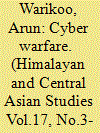

|
|
|
|
|
| Publication |
2013.
|
| Summary/Abstract |
The 21st century is rightly dubbed as an information age. Endless information is readily available made possible by interconnection of billions of computers systems globally over a backbone of networks commonly referred to as the internet the growing reliance on laptops, computer systems, ipads and smart phone to perform most of our tasks has created a parallel world the cyber world.
|
|
|
|
|
|
|
|
|
|
|
|
|
|
|
|
| 14 |
ID:
131319
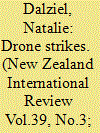

|
|
|
|
|
| Publication |
2014.
|
| Summary/Abstract |
As New Zealand's role in Afghanistan comes to a close, the War on Terror has been relegated to the backseat of the New Zealand public's consciousness, albeit prematurely so. With the first New Zealander killed in a drone strike in Yemen, it is timely that New Zealand reconsider its support for a tactic that opponents argue is itself an act of terrorism. As yet no consensus has been reached as to whether drone strikes constitute a breach of international law. We must, therefore, base our assessment on whether the tactic is ethically and strategically flawed. With every hell-fire missile that Nobel Peace Prize winning Barack Obama rains down on al-Qaeda and any civilians unfortunate enough to be in the way, a New Zealand decision on this question becomes more urgent.
|
|
|
|
|
|
|
|
|
|
|
|
|
|
|
|
| 15 |
ID:
129696
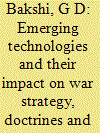

|
|
|
| 16 |
ID:
128699
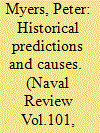

|
|
|
|
|
| Publication |
2013.
|
| Summary/Abstract |
I recently reread Dan van der Vat's book : The Ship That Changed The World, First Published In 1985. It provides an excellent account (other than a lack of large scale plans) of the escape of the German battlecruiser Goeben and cruiser Breslau to the Dardanelles in August 1914, and the subsequent entry of Turkey into the war on the side of the central power.
|
|
|
|
|
|
|
|
|
|
|
|
|
|
|
|
| 17 |
ID:
126688
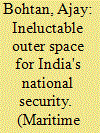

|
|
|
|
|
| Publication |
2013.
|
| Summary/Abstract |
Outer space, or simply space, is the void that exists between celestial bodies. This frontier of outer space is fast emerging as the fourth dimension (after land, sea and air) for military applications. Space will undoubtedly be the military high ground for warfare in the future acting as a "force multiplier" for any military operation. Militarization of space involves use of space technology for exploiting weapons on the ground and in the earth's atmosphere with more accuracy. India has to defend her physical, economic and cultural identity in the prevalent geo-political milieu as it faces varied and complex security challenges. There is a clear and present danger that sooner or later space could be weaponized by various countries. India can no longer be immune to the rapidly changing international security environment, threat to India's national security from nuclear and missile capabilities in its neighbourhood and the vulnerabilities of its space assets. It is therefore imperative that India exploits the capabilities of space, concurrently at appropriate levels, to achieve the desired operational capabilities in a compressed time frame. Since the early 1990s, the Indian armed forces have benefitted from the Indian Space Research Organisation (ISRO) civilian satellites. However, as operational requirements now demand an increase in military capabilities, the armed forces certainly need dedicated military satellites. This space capability has to be optimally exploited by the three services of the Indian defence forces with synergy and harmony, which is possible only under a single appropriate command structure. It is high time that India realizes: "To remain in Race, the Indian armed forces should be in Space".
|
|
|
|
|
|
|
|
|
|
|
|
|
|
|
|
| 18 |
ID:
128995
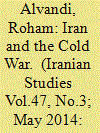

|
|
|
|
|
| Publication |
2014.
|
| Summary/Abstract |
For five decades, fromthe 1940s to the 1980s, Iran lived in the shadow of the Cold War between the United States and the Soviet Union. The country's geography, bordering both the USSR and the oil-rich Persian Gulf, meant that its territory and natural resources were of vital strategic importance in the ideological and material contest between the two superpowers, a global struggle over nothing less than "the soul of mankind."1 With the passage of nearly seventy years since the first Soviet-American confrontation in northern Iran, a growing number of scholars are examining the history of Iran's ColdWar, especially during the reign of Mohammad Reza Shah Pahlavi. Building on the work of earlier diplomatic historians, this emerging historiography looks both inward, at the impact of the Cold War on Iran, and outward, at the role of Iran in the Cold War far beyond its borders.2 This special issue showcases examples of this recent work by historians of Iran's Cold War, some of which was presented at the 2012 biannual conference of the International Society for Iranian Studies in Istanbul. Iran's importance in the Cold War is reflected in the rich literature on Iran's international history during the late Pahlavi period. The 1946 Iranian crisis marked the beginning of Iran's Cold War and the origins of the alliance between the United States and Iran, which continued until the fall of Mohammad Reza Shah in 1979.
|
|
|
|
|
|
|
|
|
|
|
|
|
|
|
|
| 19 |
ID:
130026
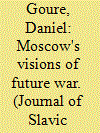

|
|
|
|
|
| Publication |
2014.
|
| Summary/Abstract |
Like the United States and NATO, Russia is struggling to define the future security environment and shape a course to the creation of a relevant and effective military. Russia's strategic vision is of an uncertain, complex and quite dangerous word with threats ranging from internal subversion through intercontinental nuclear exchanges. The Russian military faces an impossible dilemma. It must address a broadening spectrum of prospective conflict scenarios with inadequate resources leading inevitably to the fielding of inadequate capabilities. One reason that Russia clings so tenaciously to nuclear weapons is its recognition that it is the nation's central, even the sole, source of political relevance and military power.
|
|
|
|
|
|
|
|
|
|
|
|
|
|
|
|
| 20 |
ID:
126120
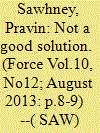

|
|
|
|
|
| Publication |
2013.
|
| Summary/Abstract |
The Cabinet Committee on Security (CCS) has cleared the formation of an army strike corps, a few independent formations including an artillery division for mountains (about 50,000 troops) and certain air force assets ( for airlift). According to reports, the raisings will be done over the next five to seven years at a cost of over Rs 80,000 crores in Panagarh in West Bengal. Meant for Arunachal Pradesh against China, these forces will have their permanent locations in the states of Odisha, Chhattisgarh, Jharkhand and West Bengal.
|
|
|
|
|
|
|
|
|
|
|
|
|
|
|
|
|
|
|
|
|